Membership for Colombia?
Counter-piracy in the Gulf of Guinea
Perspectives
Membership for Colombia?
Counter-piracy in the Gulf of Guinea
Perspectives
Daniel Drezner is an International Politics professor at Tufts University with an informative and entertaining blog at Foreign Policy. He recently published an article in the journal International Security asking whether “military primacy yields direct economic benefits.”
This is an important issue for seapower advocates, with organizations like the U.S. Navy traditionally claiming that American dominance at sea is part of the bedrock foundation of a smoothly running international economic system. The 2007 Cooperative Strategy for 21st Century Seapower argues that the “maritime domain…carries the lifeblood of a global system that links every country on earth,” and that “United States seapower will be globally postured to secure our homeland and citizens from direct attack and to advance our interests around the world that relies on free transit through increasingly urbanized littoral regions.”
The 2010 Naval Operations Concept similarly envisions U.S. naval forces that “effectively conduct the full range of maritime security operations and are instrumental in building the capacity, proficiency and interoperability of partners and allies that share our aspiration to achieve security throughout the maritime commons.”
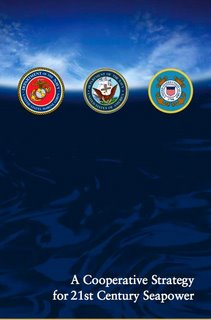
Drezner examines three potential ways in which a state’s military primacy could provide tangible benefits:
1. Geoeconomic Favoritism: “Military preeminence” may spur private sector investment both domestically and from abroad, as “all else being equal, a country is far more likely to attract foreign capital if it is secure from foreign invasion.”
2. Geopolitical Favoritism: Weaker states may “provide voluntary economic concessions to the dominant security actor.”
3. The Public Goods Benefit of Military Primacy: Military “primacy facilitates the creation of global public goods” with “a wide range of international relations theorists” claiming “that a liberal hegemon is a necessary and sufficient condition for the creation of an open global economic order.”
The particular potential benefits of U.S. seapower in its current, globally-deployed state would most likely be realized in terms of the “Public Goods Benefit.” The particular hypothesis which Drezner is trying to test here is whether “by acting as a guarantor of the peace in hotspots such as the Middle East and Pacific Rim, the United States keeps the international system humming along-which in turn yields significant benefits to the United States itself.”
In terms of concrete examples of how the U.S. military has secured the global economy by protecting the sea-lanes, Drezner cites naval operations in the Middle East, an area of both political instability and significant economic importance due to the need to securely ship oil out of the region as well as the recent multi-national campaign against Somali pirates. However, he then proceeds to question whether naval or military power can be credited with minimizing energy market disruptions or defeating piracy, pointing out that “world oil markets” can be relatively resilient and are capable of adjusting to severe price changes, and that “improved private security on board” merchant shipping may have been a more important factor in the decreased threat from Somali pirates. With his focus being military power in general, however, he does not provide a detailed discussion of seapower’s role in the global economy other than his brief discussion of oil and piracy.
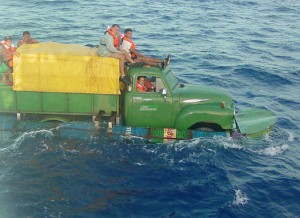
Drezner claims that if “unipolarity” and military primacy worked as predicted, China should have been “pacified” by the various manifestations of U.S. policy towards the Far East as part of the the 2011 “pivot,” but instead has acted increasingly aggressive towards its neighbors. Unaddressed in this article, yet probably at the top of the list of factors impacting and/or justifying continued U.S. naval hegemony in the Pacific, is the tangible impact of growing Chinese strength afloat. It is often assumed by China-phobes that a China with a strong navy acting assertively in regards to its claims over the surrounding oceans would be bad for the international system (presumably through somehow limiting freedom of navigation in the region), hence justifying continued American military presence in the Pacific. However, there is no empirical evidence to prove that case yet (because it has not happened), and advocates of both sides are forced to rely on hypotheticals. Drezner has asked the right macro-level questions, but it is unclear if there is specific enough data to generate a definitive answer regarding the tangible benefits of specifically American (or Chinese) naval primacy in East Asia.
Drezner concludes that military primacy is an important resource for a Great Power, but that “military preeminence” alone does not produce “significant economic gains.” Although primacy can be an “an important adjunct to the creation of an open global economy and the reduction of militarized disputes and security rivalries,” a hegemon whose economic strength is declining may not be capable of reaping the benefits of the economic system it has established and protected.
While members of the sea services or naval enthusiasts generally embrace the notion that seapower is an important element of protecting the international system and prosperity both at home and abroad as undisputed truth and gospel, the jury is still out on whether military power is always worthwhile in economic terms, and Drezner questions those often reflexive assumptions here. In an era of budget uncertainty, the Navy needs to have good tangible answers to justify its continued existence when these types of questions are asked in the future.
Lieutenant Commander Mark Munson is a Naval Intelligence officer currently serving on the OPNAV staff. He has previously served at Naval Special Warfare Group FOUR, the Office of Naval Intelligence, and onboard USS Essex (LHD 2). The views expressed are solely those of the author and do not reflect the official viewpoints or policies of the Department of Defense or the U.S. Government.
The winds of global piracy have shifted, as attacks by West African pirates now exceed those of their Somali counterparts. The Nigeria-based pirates may not yet inspire Hollywood films, but they have prompted regional governments to take collective action. A June 24-25 summit in Yaounde, Cameroon brought representatives from the Economic Community of West African States, the Economic Community of Central African States (ECCAS) and the Gulf of Guinea Commission together to draft a Code of Conduct concerning the prevention of piracy, armed robbery against ships and illicit maritime activity; now signed by 22 states.
The Gulf of Guinea’s problem is not a dramatic rise in the number of attacks, but the expansion of a criminal enterprise once restricted to Nigerian waters into those of neighboring states. While support vessels operating near Nigeria’s oil fields have been pirate targets for decades, the hijacking and full-scale pilfering of oil tankers is a recent development. This modus operandi first appeared off Benin in December 2010 and has spread to the waters of Togo and Côte d’Ivoire in subsequent years. According to Risk Intelligence data, there were at least 93 tanker attacks in the Gulf of Guinea between December 2010 and May 2013, resulting in some 30 hijackings.
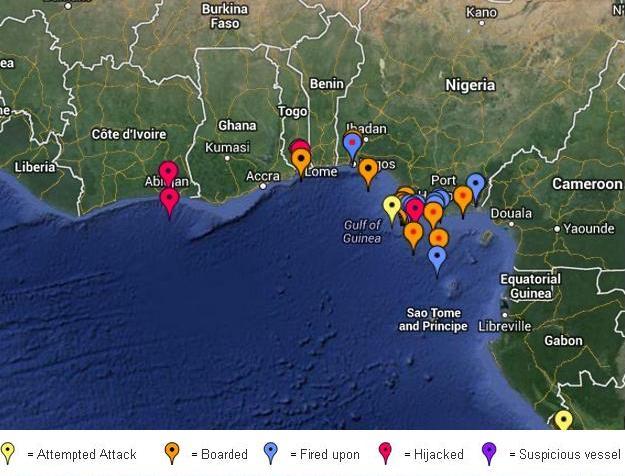
Tanker traffic is particularly dense in the Gulf of Guinea because Nigeria, the region’s largest oil producer, lacks the capacity to refine its own product. Crude oil is thus transported out of Nigeria, refined elsewhere, and then imported back into the country where it is sold at below market rates thanks to a government fuel subsidy. Nigerian criminal syndicates, backed by high-level political and economic patrons, are exploiting this situation by targeting specific tankers for hijacking, offloading their cargo to secondary vessels and then selling the product on the lucrative black market.
A conference of regional experts, held in preparation for the Cameroon summit, estimates that maritime crime is now bleeding the Gulf of Guinea’s states some $2-billion a year in lost port revenue, insurance premiums and security costs. West Africa has now reached a tipping point, like East Africa and South East Asia before it, where the geographic expansion of pirate activity demands a coordinated response. An examination of previous regional efforts to combat piracy thus serves as both a guide and warning for the Gulf of Guinea’s new endeavor.
Regional Counter-Piracy in Context
As a response to increased pirate attacks in the wake of the 1997 Asian Financial Crisis, 16 states drafted the Regional Cooperation Agreement on Combating Piracy and Armed Robbery Against Ships in Asia (ReCAAP) in 2004, which came into effect 2006. The organization is credited with reversing the spike in piracy that coincided with the 2009 global economic downturn, as attacks against ships in the region have steadily fallen from 2010 to 2013. Notable in this success was the establishment in Singapore of an Information Sharing Center (ISC) that facilitates the collection, analysis and dissemination of piracy information among member states.
ReCAAP obligates its members to take legal measures against vessels and individuals who commit acts or robbery or piracy; to extradite such individuals at the request of another state; and to render mutual legal assistance in such cases. Donations from member states fund ReCAAP’s central budget – Singapore and Japan being the largest donors – with additional support coming from out-of-area signatories such as Norway and the Netherlands.
Concerns over state sovereignty have prevented closer cooperation with ReCAAP, as equipment procurement and counter-piracy patrols remain the responsibility of individual states, and national security forces are unable to pursue suspected pirates across maritime boundaries. ReCAAP is also hampered by the unwillingness of Malaysia and Indonesia—the two most pirate-prone states in the region—to ratify the agreement.
As Somali piracy rapidly expanded in the late 2000s, the international community hoped to replicate the success of ReCAAP through a counter-piracy agreement encompassing Eastern Africa and the Arabian Peninsula. Steered by the International Maritime Organization (IMO), the Djibouti Code of Conduct (DCoC) was adopted by nine states in January 2009 and has since expanded to 20 signatories spanning from Jordan to South Africa.
An independent study notes that the DCoC has made significant progress in information sharing, legal reform, and the training of coastguards. At least twelve member states have introduced legal changes to cover the crime of piracy. These developments have been credited for the higher percentage of arrested pirates now being tried and prosecuted in regional courts. The DCoC’s projects are largely financed by an IMO-managed trust fund of some $14-million, funded by maritime states such as Japan, the Netherlands, Norway, and South Korea.
Heading Back West
Influenced by these previous agreements, the Gulf of Guinea’s new Code of Conduct calls on signatories to: share and report relevant information; interdict vessels suspected of engaging in illegal activities; ensure those committing such acts are apprehended and prosecuted; and facilitate the care and repatriation of seafarers subject to illegal activity.
As was done in Singapore, the West and Central African leaders aim to build a regional maritime security center, based in Cameroon, which will facilitate information sharing among governments. The center, it is hoped, will address the massive underreporting of pirate attacks that occurs in the Gulf of Guinea and improve regional maritime domain awareness. However, the examination of previous efforts reveals that regional competition and suspicion are likely to hamper this process. Malaysia refused to join ReCAAP because it viewed the ISC in Singapore as a duplicative competitor to the International Maritime Bureau’s Piracy Reporting Center based in Kuala Lumpur. Similarly, disagreements within the DCoC resulted in the establishment of three separate information sharing centers in Yemen, Kenya and Tanzania.
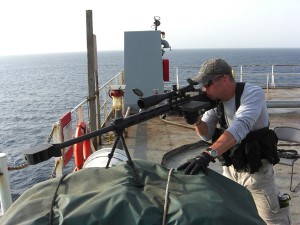
Absent from West Africa’s new agreement was any mention of the counter-piracy role that Private Maritime Security Companies (PMSCs) might play in the Gulf of Guinea. Foreign armed guards are not allowed in the territorial waters of local nations, forcing transiting vessels to hire military personnel from regional states and embark and disembark them along route. Several PMSCs were confident that the new agreement would allow them to operate inside the territorial waters of West African states, but concerns over state sovereignty and vested interests in the current system likely prevented such an arrangement from materializing.
Nor are international naval operations likely to be the panacea to West African piracy. At the summit, Ivorian President Alassane Ouattara called on the international community “to show the same firmness in the Gulf of Guinea as displayed in the Gulf of Aden, where the presence of international naval forces has helped to drastically reduce acts of piracy.” However, NATO and the EU have already begun to drawdown assets from their Horn of Africa operations, set to terminate at the end of 2014, and there does not appear to be the political will for cross-continental redeployment. Furthermore, while almost all Somali pirate attacks occur on the high seas, the vast majority of attacks in the Gulf of Guinea take place in territorial waters, primarily those of Nigeria. This serves to render foreign naval vessels both unwelcome, due to local concerns for state sovereignty, and ineffective, as they are unable to operate so close to the shore.
Live Together, Die Alone
The absence of PMSCs and international naval operations means that a counter-piracy regime for the Gulf of Guinea will have to be local and regionally owned. This is a desirable and more sustainable course of action, but it means that the new Code of Conduct must contend with the low level of maritime security capacity that permeates across the region. Nigeria is the only state in the region that possesses a frigate, corvette, or aerial surveillance capacity. However, only an estimated 28% of Abuja’s navy is operational at any given time, meaning that maritime operations usually amount to intermittent sweeps, rather than a continuous patrol presence. The other littoral nations’ “navies” are more accurately described as coastguards. Taken together, West and Central African states are estimated to have fewer than 25 large security vessels available for interdiction efforts. In terms of force multiplying, Nigeria has engaged in joint patrols with Benin since 2011, but there was little indication in the new agreement that other states will join these operations.
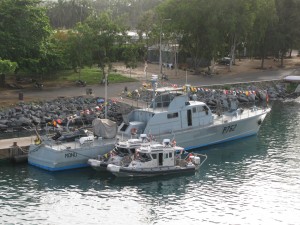
As was the case with the DCoC, the IMO has established a trust fund for the Gulf of Guinea that will allow donor states to offset capacity building costs, and it is advisable that the U.S, EU, Japan and others use this as a common channel to coordinate their existing security efforts in the region. Not limiting itself to carrots, the U.S is also trying to exert pressure on Nigeria by issuing a 90-day ultimatum (set to expire at the end of August) to improve port security or face the diversion of U.S-flagged shipping.
While piracy is now a regional issue for the Gulf of Guinea, this ultimatum highlights the fact that the drivers of the crime and its ultimate solution both lay in Nigeria. The country’s fuel subsidies and the lack of local refining capacity are at the root of West Africa’s petroleum black market, and endemic corruption has protected the economic and political elites suspected of profiting from it. Inequality and local grievances in the Niger Delta have been only superficially addressed by payments from a government amnesty program, leaving a massive pool of unemployed young men who see piracy and oil theft as their ticket out of poverty.
Off the coast of Somalia, international naval operations, regional agreements and private armed guards have helped to suppress and contain piracy. In the Gulf of Guinea, enhanced regional cooperation – through information sharing, capacity building, and joint patrols – should serve to roll back the geographical expansion of Nigeria’s pirate gangs. In both cases however, a permanent solution rests within the state that gave rise to regional piracy. Closer maritime coordination in the Gulf of Guinea is a welcome development, but the road to secure marine environment will ultimately have to run through Nigeria.
James Bridger is a maritime security consultant and piracy specialist at Delex Systems Inc. He can be reached at jbridger@delex.com
Given the recent tendency of many Japan watchers to focus on some of the more eyebrow-raising news from Japan – ranging from predictions of an ‘Abegeddon’ through possible constitutional changes to historical revisionism – it may be timely to shed light on one particular Japanese multilateral initiative that has seen increasing international interest. The Regional Cooperation Agreement on Combating Piracy and Armed Robbery against Ships in Asia (ReCAAP) is the world’s first regional intergovernmental body designed to combat piracy and armed robbery (PAR) against ships. ReCAAP was born out of the Asia Anti-Piracy Challenge Conference held in Tokyo in 2000, which followed in the wake of the 1997 Asian Financial Crisis and the resulting spike in PAR incidents.
A concrete initiative to establish such a body was made by Prime Minister Koizumi during an ASEAN+3 Summit in 2001, and the ReCAAP Agreement was drafted by 16 Asian countries in 2004. It entered into force in September 2006, followed in November by the establishment of an Information Sharing Centre (ISC). This Singapore-based ISC serves as a hub for information exchange on PAR incidents between all contracting states. At present, ReCAAP has 18 such contracting parties, including four from Europe (Denmark, the Netherlands, Norway and the UK). As the first framework of its kind, the ReCAAP model has enjoyed significant success and served as a model for the creation of the Djibouti Code of Conduct (DCoC), and is now in the early stages of forming the basis for a similar information sharing mechanism in the Gulf of Guinea.
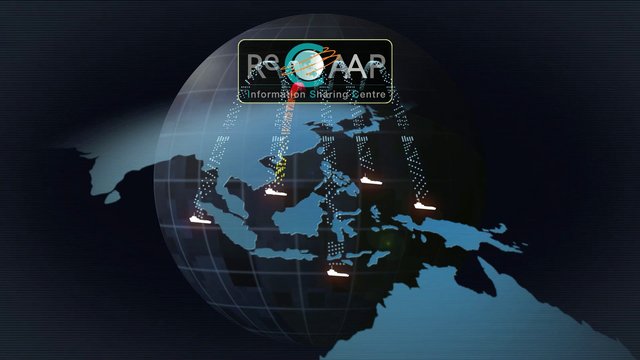
According to the latest available figures, the number of reported piracy and armed robbery attacks against ships in Asia – most of which occur in the waters, ports and harbors of Southeast Asia – continued to decline over the course of the first five months of 2013. This year thus continues the positive trend from 2011 and 2012 when the number of incidents began to decrease for the first time since their surge in 2009. Although not the only factor to contribute to the decrease, facilitating information sharing has proven invaluable in a region crisscrossed with maritime boundaries, exclusive economic zones (EEZs) and ongoing territorial disputes. Detailing ReCAAP’s information sharing and incident reporting procedure would be beyond the scope of this post, although some of its intricacies may well be addressed in more detail in a separate piece in the future. Until then, a general overview of the reporting procedure can be found here (appendix, page 26).
Despite its relatively modest funding (all of ReCAAP’s funds are obtained through voluntary donations by contracting parties), which will amount to approximately 2.2 million USD in the fiscal year 2013, ReCAAP’s three principal tasks – information sharing, capacity building and cooperative arrangements between contracting parties – have made a tangible contribution towards reversing the rising trend in PAR incidents in the region.
After having authored a paper on PAR in Southeast Asia and the role of ReCAAP back in March, I was glad to have the opportunity to welcome a delegation from the ReCAAP ISC at a round table organized by the European Institute for Asian Studies (EIAS) in Brussels on 21 June. Their visit coincided with a period of increased international interest in the Agreement and its work, as Australia is set to become the 19th contracting party this August. France and the U.S. have also expressed an interest in joining, which would increase ReCAAP’s membership to 21 and expand the range of its information sharing network from Asia into the Pacific proper. Finally, as the EU contemplates becoming a partner organization over the coming years, the role of Europe within the framework will increase even further.
As its information-sharing model sees increasing adoption in other PAR ‘hotspots’ across the globe, ReCAAP will continue to attest to the capability of Japan to engage with its neighbors in multilateral fora (both China and South Korea are contracting parties) and shape pan-Asian initiatives. With some of the recent changes in the country’s political-security milieu putting its neighbors on edge, perhaps the time is right for Japan to reaffirm this capability. The 2001 ‘Koizumi initiative’ was a success; has the time come for an ‘Abe initiative’? It could build on ReCAAP’s success or outline a new multilateral framework that would help safeguard the global commons, be it in the maritime, cyber, air or space domain. Crucially, such an initiative could assure the participation of Japan’s neighbors while giving Tokyo’s soft power a welcome boost in the process.
Miha Hribernik is Research Coordinator at the European Institute for Asian Studies (EIAS) in Brussels and an analyst at the geopolitical consultancy Wikistrat. The views expressed here are entirely his own. This post appeared in its original form on the website of the Japan Foreign Policy Observatory.